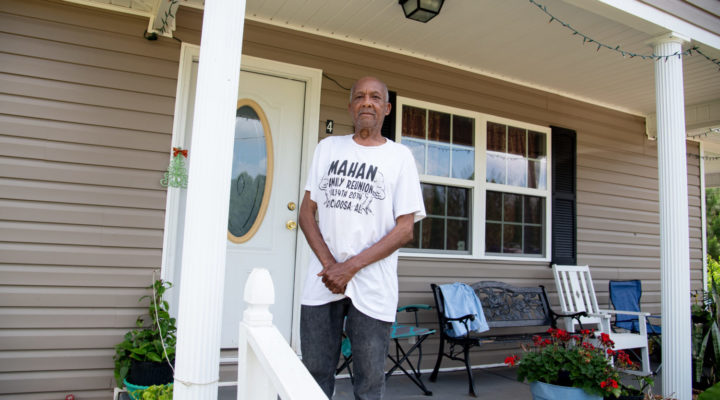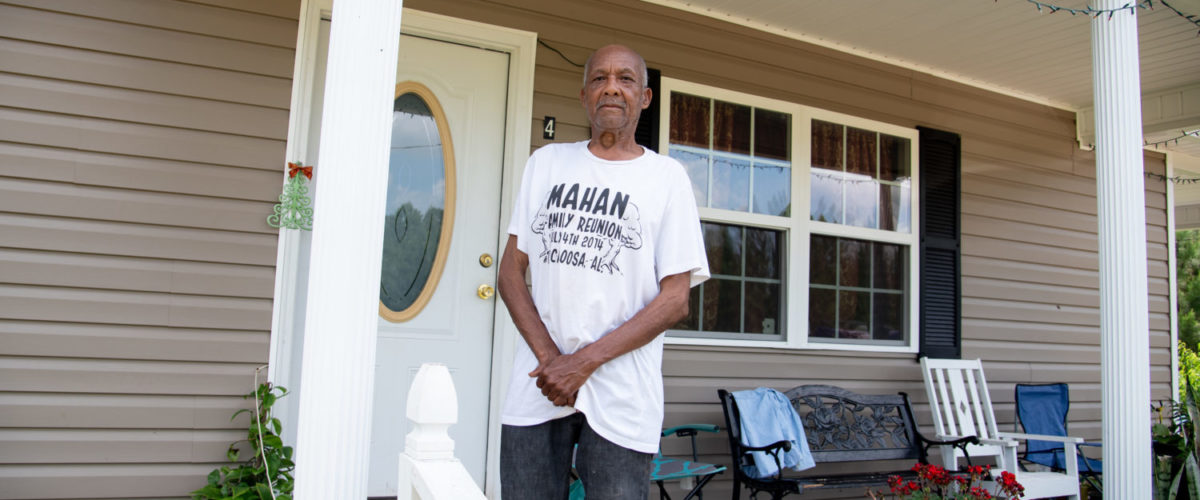It’s only 4 p.m. but Willie Roy King is already hunched over a plate of pork ribs. He just turned 81, after all, and this is Marion, Alabama. The dense pines are baking in the afternoon heat, along with his GMC pickup stranded in the driveway. The prime shade of the car-park now belongs to King and Jennie Bell, his wife. Perched in luxury on grey plastic lawn furniture, Jennie and Willie wear a tacit peace on their faces, as if life had done its worst but lost the battle.
Sitting in the cool shade of their new home is just about all it takes now to feel like royalty, Jennie Bell says. That and creating a virtual botanic garden in the front yard. Devil’s backbone dots the landscape with paradise pink. Snake plant, too. The cotton-candy-colored hydrangea hangs low in the late-May lull, unable to carry their weight any longer.
“We just enjoy working together and learning how to do things,” Jennie says. “I cut me a little heel of watermelon or cantaloupe, plant in the flower yard and work on the house. I’m enjoying it more and more, the older I get. I just get right out here, no children. All my children are grown.”
“I thought they was our children,” Willie chimes in with a chuckle.
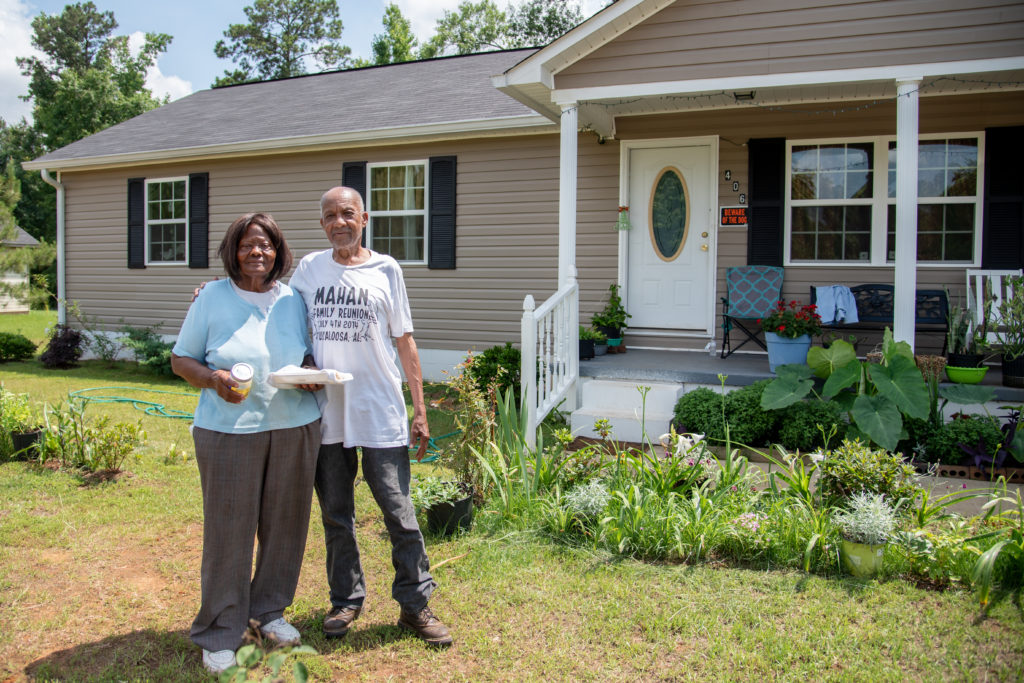
Jennie Bell and Willie Roy King pose in front of the house they helped build.
Make that eight children, all of whom they raised at their former home in remote Sprott, Alabama — the kind of home that doesn’t have municipal water or indoor plumbing. But suddenly, even the word “poverty” feels utterly ridiculous for such richness and gratitude. Whatever it is, they know it too well. They also know the strength it takes to finally ask for help from friends like Frances Ford, director of Sowing Seeds of Hope, part of the Cooperative Baptist Fellowship’s rural development coalition, Together for Hope. Through SSH’s self-help housing initiative, the Kings helped build their new home in Marion two years ago after qualifying for a $120,000 fixed-interest loan with assistance subsidy from USDA Rural Development.
Many groups try to develop rural communities like Perry County, but few find sustainable traction. It takes uncommon trust and perhaps generations to unravel the tangled knot of rural poverty in Alabama’s Black Belt, named for the color of its topsoil as well as the African American and black communities that have dwelled there for centuries. The roots of slavery and Jim Crow run rampant as the invasive kudzu, enveloping the landscape and choking off investment in black lives. Disinvestment means scant opportunity for employment. When you can’t generate income, you can’t invest in a house, vehicle or healthy food. Without proper nutrition, diabetes and hypertension thrive. Without a vehicle, you have no transportation to the dialysis clinic or nearest hospital — which, by the way, is 50 miles round-trip. Without a suitable home, you hardly have a position of strength from which to build.
The paradox, Ford says, is that Perry County residents don’t look at their community and see scarcity or deprivation. That perspective typically belongs to the wealthy and privileged.
“Poverty is a reality in Perry County,” she says. “It exists. But at the same time, those individuals still have joy. They still have hope. And if you’re only going by numbers or judging Perry County by the other thousands of counties in our nation, you will short-change this community.”
“If you come and see the people, and talk with them, they don’t talk about how they’re living on less than $12,000 a year. They’re not talking about the fact that they go to bed hungry at night or that they don’t have a hospital. Their focus is on their joy and the things they do have. There is a lot of love. People in this community have a sense of bonding and a sense of helping each other, neighbors being neighbors.”
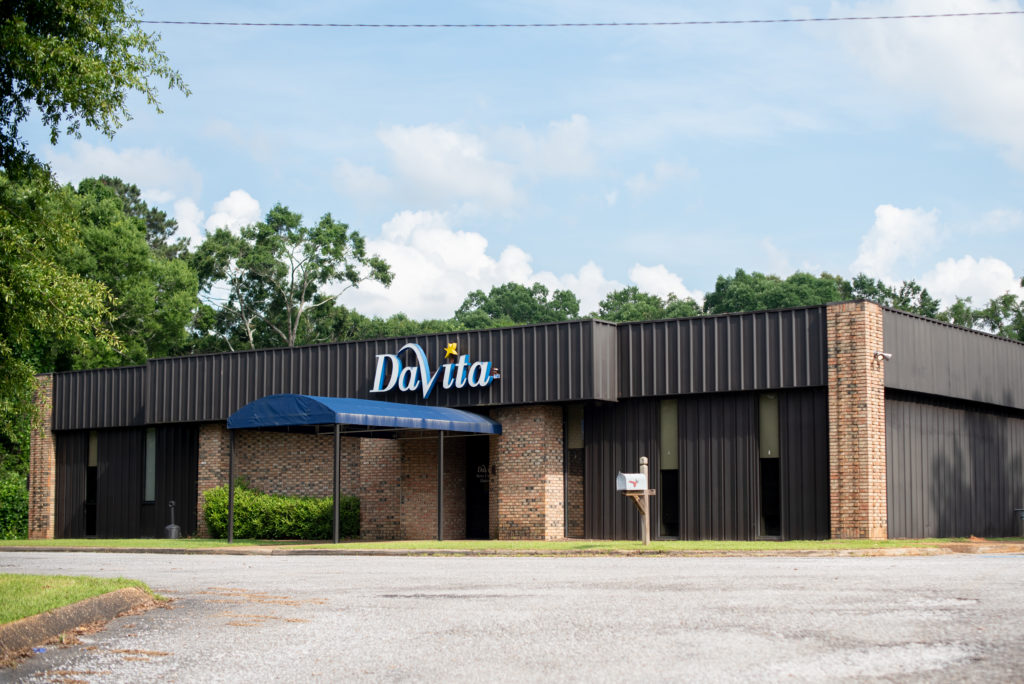
Before Sowing Seeds of Hope and its partners advocated for a dialysis center in Marion, the closest hospital required a 50-mile roundtrip. SSH is currently fostering a movement to bring a hospital to Marion itself.
Still, that joy and love have not obscured the nation’s eye in focusing ever closer on the destitution in America’s most isolated communities, especially as our unique regional identities begin to shape public policy in unprecedented ways. In May 2018, NPR’s Brakkton Booker declared the state of rural poverty “an emergency” in his examination of the United States’ unfavorable world poverty ranking. That’s why Sowing Seeds of Hope has been building relationships in Perry County for nearly 20 years, with a distinct focus on health and housing — two complicated realities that are not easily separated, according to Ford.
“If people’s lights are not on, they don’t care about whether they can afford their medicine or not. I know people making choices between buying medicine, eating, or paying their bills because many of our residents are living on less than $800 a month.”
At a 40 percent poverty rate, Perry County consistently remains in the top two poorest counties in Alabama, a state that already holds the fourth highest poverty rate in the United States. All things being equal, Perry’s County’s black community experiences 2.3 times the poverty rate of white residents. Transitional homelessness abounds. Those with homes often fall outside the utility grid, forcing many to use outdoor bathrooms, cook on wood-burning stoves and endure the escalation of environment-based health problems.
But Ford and her partners in Marion have little time to focus on macro-injustice. They’re too busy mobilizing hundreds of volunteers from across the state to repair leaky roofs, install handicap ramps, remodel bathrooms and help residents apply for their self-help housing initiative and subsequent USDA home loan. By the end of 2019, Sowing Seeds of Hope will have completed 23 new homes for families, most of whom continue to engage in SSH’s health and education programs.
Willie and Jennie Bell attend SSH’s monthly blood pressure screenings and receive assistance enrolling in Medicaid, Ford says, but more than anything, they love to sing and perform at Sowing Seeds of Hope’s annual Christmas celebration every December. Without invitation, Willie interrupts the conversation mid-sentence with a gravelly tenor, followed closely in unison by Jennie Bell:
When I was in darkness, my way was black as night
But Jesus brought me comfort and he led me to the light
He took away my sorrow and he made my burden light
He is everything to me
If it wasn’t for my Lord, tell me, what would I do?
What would I do, tell me, what would I do?
If it wasn’t for my Lord, what would I do?
He is everything to me
Willie wears a proud grin through his gray stubble, but this wasn’t a performance. This was liberation, even from within a web of economic and social injustice. This was a song the Kings have sung for decades, well before they ever dreamed of a safe and healthy home. But we’ve halted supper for too long, and Jennie Bell returns to her plate.
We would have brought pie if we had expected to interrupt dinnertime — although in Marion neighbors don’t announce themselves. Calendar entries don’t command your day. You blow two hours catching up over lunch at Lottie’s Restaurant. There is a gracious fluidity to life in Perry County that seems to pose a direct affront to the rigid schedules urbanites keep inside their subways and Subarus.
But food now takes a backseat to the main event — guests are here to see the house — and it’s all we can do to keep our seats for a little more conversation.
“Show ’em the house, Frances!” Willie pleads repeatedly. We finally halt our questions and succumb to the grand tour.
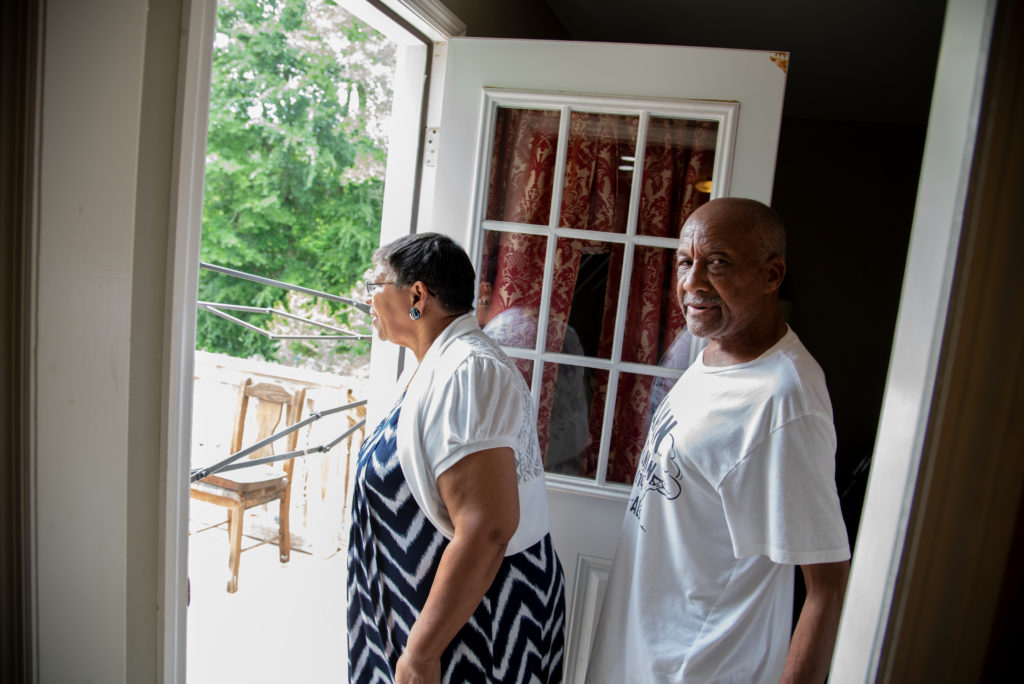
With two bedrooms, two bathrooms, a kitchen and a generous living room, the Kings’ new home is a vast improvement from their former home in remote Sprott, Ala., which had no running water or indoor plumbing.
Willie quickly ushers us inside their two-bedroom abode, complete with a brand-new kitchen, dining area, two bathrooms, and a generous living room, each space more intentional than the last. All the unique marks of a home rush over me in swift succession — the soothing chill of summer air-conditioning, a fully-stocked pantry, a rerun of Bonanza chattering in the background as Willie describes every last nook of their new house. It seems he would have us stay all evening, but we settle for an open invitation back, no calendar required.
As we pull away down the hill, Ford admits that, in the eyes of many people in Marion, folks like the Kings don’t deserve to have a home.
“They won’t take care of the house anyway,” they argue, often in the name of saving taxpayers money. It occurs to me that the Kings might as soon tell them to stuff their precious money. Maybe not. Maybe it’s at least one small transfusion of justice to a couple who deserves a safe roof over their heads and a cool bed to sleep in as summer approaches. Either way, Willie and Jennie Bell King will take in the last sunset of spring from the shade of a house they helped build, because of friends who see beauty and strength in the people of Perry County. The alarming facts and numbers will always scream of the power of poverty, but joy speaks softly for those who will hear it, for those who will pull up a lawn chair and sit for a while.
Read more in the Perry County, AL Series
‘Everything to Me’: A resilient couple finds home and hope in one of Alabama’s poorest communities
Photo Gallery: Perry County Alabama
Perry County, Alabama: Fields of Paradox
Video: Frances Ford on Justice
Related commentary at baptistnews.com:
There is nothing too good for the poor | Greg Jarrell
Are the poor really blessed? | Chuck Queen
Related news at baptistnews.com:
White House panel report says system, not personal decisions, drive poverty
Alabama: Perry County is a series about holding a healthy tension between a perspective of scarcity and one of joy and strength. What, in all realities, appears to be extreme poverty may actually represent generations of strong, resilient families who have made a true home in Perry County. This series in the “Resilient Rural America” project is part of the BNG Storytelling Projects Initiative. Has the United States forgotten its countryside? What strength and resilience may yet be stirring outside our city limits? In “Resilient Rural America,” we attempt to answer these questions when we visit these unique communities to examine the singular nature of poverty in rural America and tell the stories of development among its courageous and resilient people.
_____________
Seed money to launch our Storytelling Projects initiative and our initial series of projects has been provided through generous grants from the Christ Is Our Salvation Foundation and the Eula Mae and John Baugh Foundation. For information about underwriting opportunities for Storytelling Projects, contact David Wilkinson, BNG’s executive director and publisher, at [email protected] or 336.865.2688.

